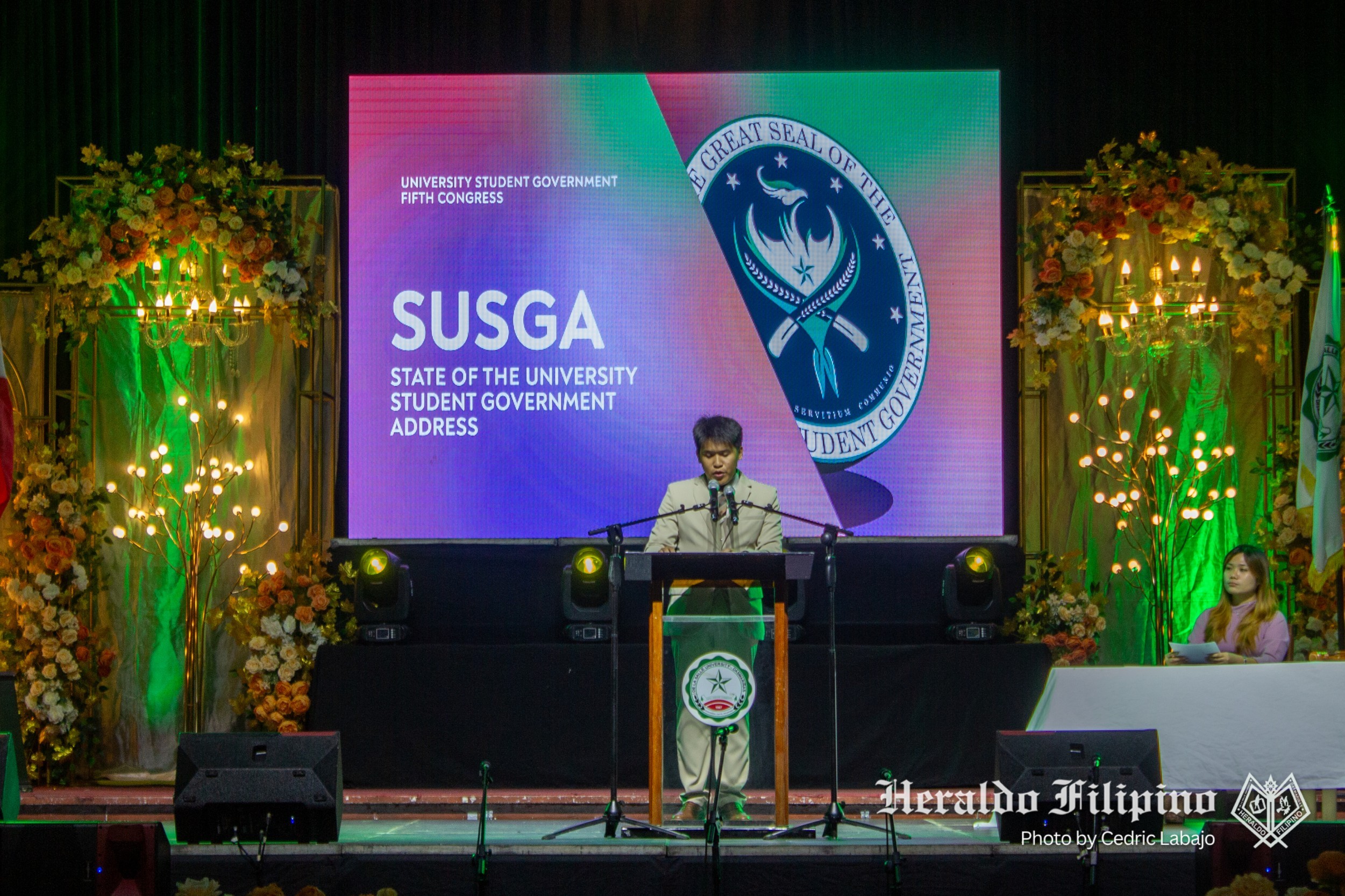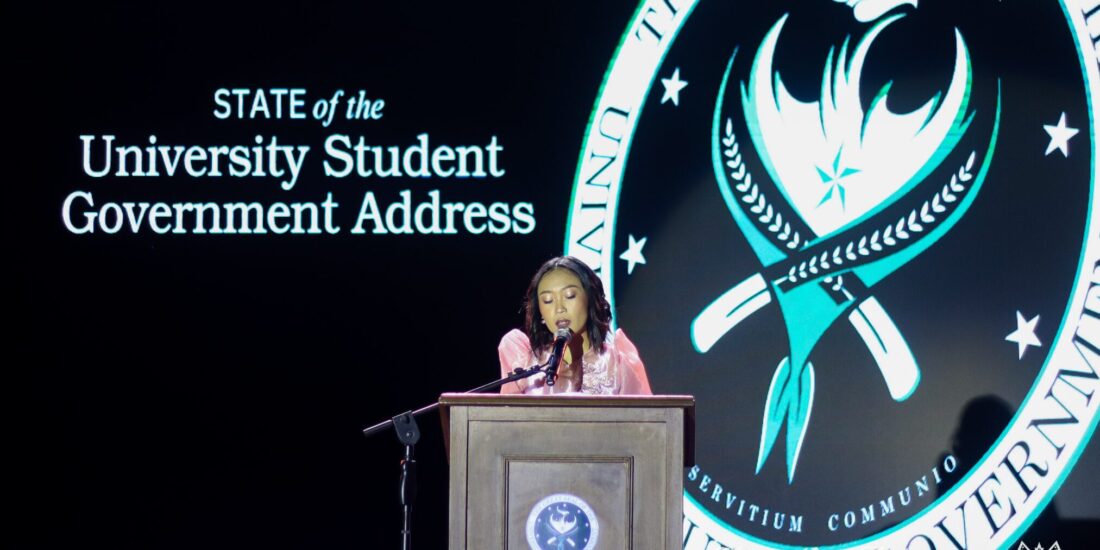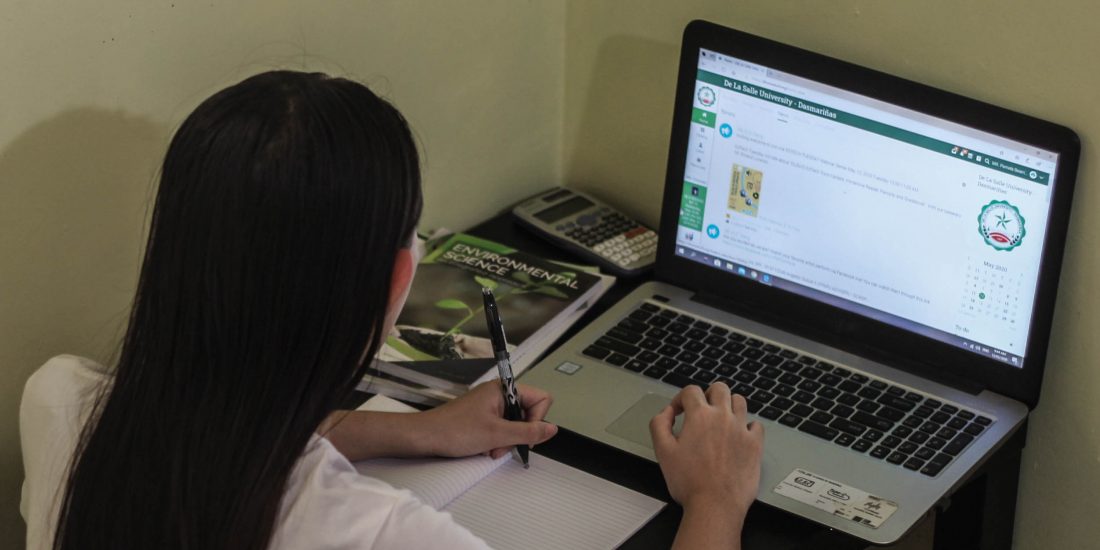USG president addresses accomplishments, pending developments for 2nd SUSGA
Academic year (AY) 2023-2024 University Student Government (USG) President Benedict Bravo addressed and highlighted the completed programs, projects, and services implemented under his administration during the State of the University Student Government Address (SUSGA) held at Ugnayang La Salle (ULS) last Saturday, June 8.
Bravo emphasized that service does not end on his term, rather the progress and work shall continue. He began his speech by sharing that regaining the trust of the student body to USG is a process that involves both progress and setbacks. Despite the mixed results they have seen, the most important concern is the 26 aspiring candidates who filed their Certificate of Candidacy (COC), which is more than the number of participants in the previous 2023 Special Elections.
“Nakita natin ang pagiging active ng mga student leaders, ngunit bumaba ang voter turnout,” he stated. Although there is an increase in the number of student leaders, the voter turnout for this academic year is 56.13 percent, which is points lower than last year’s 69.06 percent.

Bravo emphasized how Lasallians have shown their desire to choose their own leaders and have become more critical in their selection process as they understand that their future is in the student leader’s hands. He reiterated, “Habulin ninyo sila [student leaders]. Papanagutin ninyo sila araw-araw.”
While there are still concerns about student representation, he encouraged the students in calling out student leaders and holding them accountable every day. He also expressed that he is convinced that the elected officials will serve the interests of the students more than their own personal interests.
Bravo shared that the funding for the damaged roofs and air-conditioning of the USG office has been resolved, and all three constitutional commissions now have their own offices. He also mentioned that even though his administration was defined by different challenges, including transport strikes and extreme heat index, they managed to push through.
He shared, “Mahirap magtrabaho kung kulang-kulang kayo, alam ’yan ng ibang organisasyon,” wherein he mentioned that many applications for several positions within the USG were opened, yet vacancies remained. Despite this, the policy of prioritizing “quality over quantity” was maintained, as he acknowledged the issues related to the vacancies, including the need to address the challenges while ensuring that necessary work is completed effectively. He also added that the Office of the President, which is now in charge of the position of Secretary of the Treasury, is taking on additional responsibility and has full control of the budget where they were able to reduce expenses as well. USG reduced their spending in the first semester, and even further reduced it during the second semester. They spent 76.82 percent of their budget, specifically P1,782,596.83 in the first semester, and P1,369,418.80 in the second semester. In addition, the budget allocation for this year is 16.20 percent less than the expenses from last year’s administration, which totalled in P3,250,000.
Bravo stated that the USG had completed a lot of projects despite imperfection including the Animore: Unleashing the Green Spirit, Ginoo at Binibining La Salle Dasmariñas 2024, and ALAB: Ani ng Lahi at Bayan 2024. Moreover, he recognized the expanded financial aid program explained at Animore, which provided monetary grants to ten students in the first semester and 24 students in the second semester. Meanwhile, the implementation of the rules and regulations (IRR) for the Research Grant Act and Mental Health Emergency Act is still ongoing, with the process of budgetary approval for Student Development and Activities Office (SDAO) through the Congress. On the other hand, he also explained that there is a need for continued improvement in terms of inconsiderate behavior of certain professors and facilities.
Bravo stated that as per the Article IV, Section 20, 2019 USG Constitution, the USG president shall represent the student body in any academic council convened by any sector of the University. In terms of their efforts to become a permanent member of the academic council, they made actions including the Student Handbook revisions. He explained that the final reading of the new Student Handbook is almost finished, which was expected to be released this past AY, and that the Office of the Student Services (OSS) is targeting to finish it by July to make it effective for the AY 2024-2025.
In line with the ongoing Student Handbook revisions, Bravo mentioned that the academic council committed to pay attention to certain critical issues in the University, including the dress code policy, LGBTQ+ inclusivity, grading system, tuition fee increase, and student rights.
“Hindi pa man lubos na pinapayagan ang gender affirming clothing ay nagbigay ng commitment ang academic council na pagtutuunan [ito] ng pansin,” he stated, explaining that despite a lack of full permission, the council is addressing these matters to make the institution more inclusive. In relation to gender-based cases in the University, the Committee On Decorum and Investigation (CODI) currently sits on five cases, two of which were highly-sensitive, as per Bravo. One case, in particular, was elevated to the University Discipline Board but to protect the privacy of personnel involved, he does not share further details and informs the University that the justice has been delivered. During one of their meetings with the CODI, the then-USG President has noted how they are pushing for a more gender-inclusive University through data. They proposed that students shall be able to indicate their gender identity and expression as well as their preferred pronouns and names upon enrollment.
USG has also suggested lowering the grade requirement for Latin honors from 2.50 to 2.00, but they decided that the grade requirement should remain at 2.50. There were discussions about changing it to 2.00 for minor subjects and 3.00 for major subjects, but it was also not approved.
According to Bravo, the USG urged the administration to preserve Self-Care Week (SCW) on the academic calendar, and their administration also focused on data-driven and transparent solutions, such as Disaster Risk Reduction and Management (DRRM), in order to have a more inclusive institution. There were also multi-sectoral meetings that the USG attended in between February to March to discuss the Tuition and Other Fees Increase (TOFI) for the upcoming AY. He added that a proposal including a five percent increase in tuition and school fees was presented, but he noted that according to the University authorities, the proposed increase will only be three percent, which is still pending and has not been approved by the Commission on Higher Education (CHED). Meanwhile, USG and seven College Student Government (CSGs) emphasized the importance of transparency before agreeing on a tuition hike, and the University administration affirmed its commitment to release transparency on where the money is allocated for the said increase.
With regards to Philippine Accrediting Association of Schools, Colleges and Universities (PAASCU) accreditation, which ensures the quality and excellence of the University to adhere to the rigorous standards, Bravo stated that he personally participated in the cases affecting this including Area IV (teaching and learning), Area V (student services), and Area VII (research).
“Rights to peaceful organization should not be trampled kahit ng highest authority sa University.” Bravo also emphasized that USG stands with students, especially in regards to the situation of Paolo Tarra. He said that the appeal process is still ongoing, meaning that the board cannot disclose too much information and emphasized that they firmly support Tarra and the student body, as they are dedicated to looking after the rights, welfare, and interests of students, and ensuring that they are being served.
Bravo also mentioned the Animo Town Hall where students were given the opportunity to voice out their concerns and suggestions regarding matters in the University. With this, problems during the second semester, such as facilities and security along with several reports of inconsiderate professors, were heard and investigated by the Vice Chancellor for Academics and Research (VCAR). He added that the University has also improved its classrooms and laboratory, replaced damaged equipment, the quality of audio-visual materials, addressed the mandatory and discretionary requirements for online classes during the finals term, and the internet connection (DLSU-D Konek) is much more faster now, but there are still areas where the signal is slow.
Transitioning to the next USG administration

Moreover, he stated his vision for the following term of USG President-elect Abigail Hapal. He shared his hopes for the upcoming AY, such as how joint votation for the presidential and vice presidential positions during elections will no longer be necessary, the creation of executive orders for central committees, release of governance transactions, and the review of all existing Acts of Congress. He also revealed that his term ended without any debt, expressing, “We are better today than we were a year ago, and it will be better a year from now.”
Hapal also focused on hopes that she has for the future as she believes that the University can do better in providing students with opportunities in career advancements. She specifically aims to create possibilities for members of the LGBTQ+ community, student activists, persons with disability (PWD), athletes, student journalists, and those who are financially struggling.

Furthermore, Hapal wants to make safe spaces for the students and bring them justice. Accessibility and inclusivity, according to her, is possible, as the University is “flawed but not unchangeable.”
She also calls for solidarity among other offices with the USG and student body, believing that they are not just the government but student movement, explaining, “We are at the forefront to mobilize our people to do what is right and condemn what is wrong.”
With this, she mentioned her presence during the protest for Paolo Tarra. She told the faculty, administration, and stakeholders that despite this, she is open to collaborate and discuss with them as they are supposedly influential and are their allies in protecting the rights of students. “We hope to create possibilities with you,” she emphasized.
Hapal ended her speech by telling the student body that the USG will always stand with it. She ensures courage in standing up for them as the newly-elected President. Being considered the highest voted USG president, Hapal sees no excuses not to do better, promising to deliver results.
Furthermore, the program also included the oath taking for all the elected student-leaders for the upcoming AY 2024-2025.

Photo slider by Cedric Labajo





